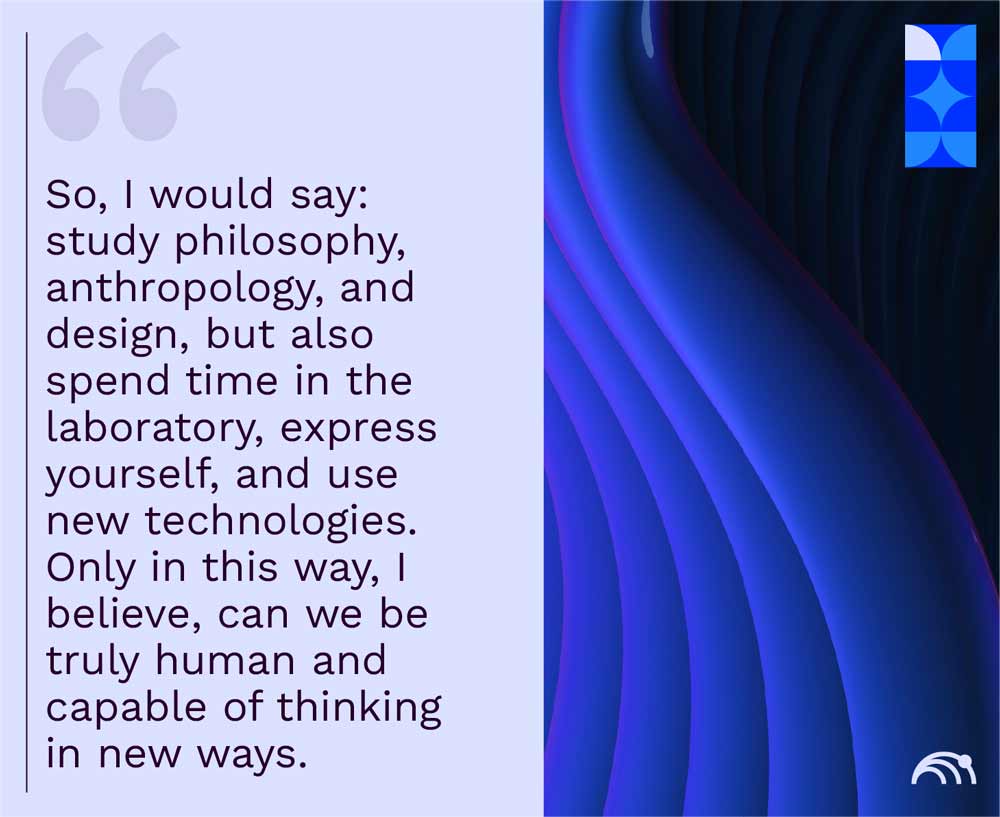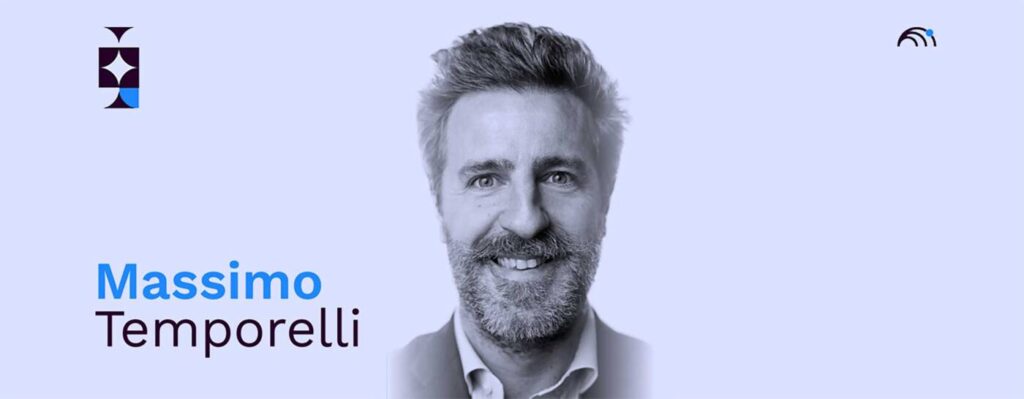Stimulating the contamination of knowledge to generate new perspectives and solutions. Explore the forefront of the next human transformation in an interview with Massimo Temporelli.
Innovation is not just a matter of digital tools and technological progress. It is a continuous journey towards new ways of working, acting, and being. The production of new devices and changes in business models are the result of the search for answers to certain needs. Innovation is a foundational process of humanity.
The human species has achieved significant growth through its ability to adapt and respond to challenges over time. We are immersed in an atmosphere permeated by the idea of incessant progress. How urgent is it to know how to innovate?
Today we’re surfing with Massimo Temporelli, Physicist and Science educator.
Today, more than ever, we talk about technology, innovation and the future, sometimes losing the value of these concepts. What is a good definition that does justice to the word “Innovation”?
Innovation is not merely a technicality, trend, or marketing strategy, nor is it solely connected to digital advancements. It is linked to new ways of doing things. I like to translate “innovation” into “new action.” Innovation is something that produces new actions.
Our actions depend on the use of new tools. Therefore, the mastery of fire, glass, the fork, and electricity were innovations because they enabled new actions, new practices, and a new humanity.
Innovation is the process by which we learn to do new things thanks to new tools. It is not technology for the sake of technology or machines for the sake of machines, but it concerns our deep humanity.
With innovation, our social and anthropological practices change, and we become something different.
In one of your recent TED Talks you introduced the concept of “Homo Artificialis” by describing technology as “humanizing” – in total contrast to the most widespread narrative. What is the relationship between humans and technology?
While our nature (or biology) remains practically unchanged over centuries and millennia, the culture of our species (technology) changes and evolves thanks to the tools we imagine, design, build, and then use. Gilles Deleuze wrote that “We belong to devices and act within them.”
It has always struck me that the French philosopher refers to the verbs “to belong” and “to act.” But that’s exactly how it is. We are humans—a certain type of human—because we belong to a specific set and type of instruments, which change across different eras.
I summarized this concept with the title of my latest book: “We are technology,” precisely to convey that technology is a driver of humanity, not just a tool that we can choose to use or not use.
What does dissemination mean in science and technology, and what are the impacts on society, business and people’s private lives?
In Italy (and in Europe), this action could truly change things more than any other initiative. I firmly believe that most of our problems—ranging from economic to managerial, industrial, and social issues—stem from our scientific and technological ignorance. I’m not referring to flat-earth beliefs, chemtrails, or other misconceptions.
I’m talking about the very low propensity in our culture, even among the ruling classes, to experiment, make hypotheses, and validate models based on data. This lack, combined with the low propensity to quickly and effectively adopt new technological tools to innovate markets and societies, creates a deleterious mix.
For this reason, fostering a culture of science, technology, and innovation is not just necessary but crucial for our future. It is not a technical issue but a social one, as it would create well-being.
Much of the technology that people use every day is designed to be simple and intuitive. What are the risks of not knowing the complexities?
It’s true, we can all watch or upload a video on YouTube, make a post on LinkedIn to communicate with the world, ask an AI to correct a text for us, or connect our washing machine to an app on our smartphone.
These technologies and opportunities, which 20 years ago were only for specialists, are now available to everyone. But the technologies available today are much more advanced and provide an excellent understanding of complexity.
Think of the virtuous supply chain: sensors, cloud computing, data, and artificial intelligence. How many of us or the companies we work for have undertaken concrete actions and campaigns to collect, archive, and refine data? And how many use this data to train AI and create machines useful for our business?
Multidisciplinarity is needed. Skills in electronics, statistics, IT, and coding are necessary, as well as business acumen. Silos must be broken down, and complexity-management is essential. The success of the next few years will depend on these technologies and skills.
Do you have any advice for young people who want to pursue a career in technological innovation?
What I will tell my daughters: pursue the ability to make hypotheses and carry out tests, making mistakes and refining your model of the world in which you live.
Then, as mentioned, learning to read and embrace complexity is important: choose training courses that focus on the connections between different fields of knowledge rather than mere verticality. That’s right, post-disciplinarity is and will be crucial. I believe the era of science for science’s sake, design for design’s sake, and coding for coding’s sake is ending. “Contamination” is a word to think about.
In the end, design is key. Design does not mean strange shapes and amazement; design is the interface between humans and new technologies. Working on this boundary between human practices and new technologies will be a source of wealth.

How is technology changing and what are its effects on people’s daily lives, on society and on the environment in which we live?
We are in the era of the Fourth Industrial Revolution, known as Industry 4.0, which began in 2010. History teaches us that industrial revolutions last for two generations (about 50 years). This was the case for the First Industrial Revolution (Industry 1.0), the Second Industrial Revolution (Industry 2.0), and the Third Industrial Revolution (Industry 3.0). The same will be true for the Fourth.
This means that for the next 30 to 35 years, we will need to create and learn to live in a new ecosystem where atoms and bits mix, and where services and products merge. Smart cars, smart cities, smart factories, smart homes, and smart products will all exemplify this fusion of the physical and digital. This is our planning and cultural task, at least until 2060.
What emerging trends in technology do you think are the most promising for the future?
Artificial Intelligence is taking over everything. It’s not evident yet, but it will be soon. I don’t see anything bad or dramatic about it, but we need to prepare, study, and change our mindset, as has happened on other occasions in the past.
In short, here is another human transformation. Are we ready to embrace it? On a professional level, there are great opportunities, but we will have to know how to ride these trends. For citizens, new products will arrive on the market—increasingly empathetic and personalized products, a mix of hardware and software.
Finally, robotics, thanks to AI, could make that evolutionary leap promised for decades. They could be combined with IoT and Cloud to redesign our world.
What are your thoughts on the future of work in a world increasingly dominated by technology and automation?
Despite AI and robotics, I believe that Homo sapiens has abilities that will remain important and crucial in the world of work, even in the future. However, we will need to bring them out again. I’m talking about characteristics we have forgotten because we were focused on the old model of work that has dominated the last 200 years—specialization, silos, assembly lines. These tasks will belong to machines.
We will nurture a mix of skills in philosophy, anthropology, technology, and design to be more appreciated in the job market, where the ability to create empathy and concrete relationships with stakeholders will be necessary. We will return to learning how to tell stories and ask the right questions. For the answers, there will be machines. The trend of asking questions will return.
In your opinion, is there an aspect, and if so which one, that all those you define as “f**king geniuses”, i.e. these great figures/talents who have changed our evolution, have in common?
Different aspects are important, but the most crucial is the capacity to live, understand, and draw resources from the context in which we live. To deliver the maximum of our potential, we should frequent (or build and nurture) the right context.
In my podcast, I always say that Steve Jobs would not have existed without Silicon Valley, we would not have had Edison or Ford without the East Coast of the Second Industrial Revolution, and we would not have had Albert Einstein and Marie Curie without the physics crisis of the early 20th century.
There is no such thing as an isolated genius; we need the right environment to make talents blossom. Contexts are crucial, and we are responsible for nurturing them.
If you could have a Mentor among these “f**king geniuses” or among other protagonists of the past, who would you choose and why?
For me, it’s like asking if I love my first or second daughter more; it’s impossible to choose between the many geniuses I’ve talked about. Let’s say that Einstein and Jobs are the ones I would go back to most often for advice, not only for their intelligence and what they achieved but above all for their vision and style—for how they did things, more than what they did.
Considering the ethical and social implications of technologies, what is your opinion on issues such as accessibility, social impact, and responsibility? How can we address these challenges as we move towards a technologically advanced future?
When considering ethics, the initial crucial step is to perceive our species as something peculiar; we are a blend of biology, technology, nature, and culture. Thus, despite assertions by some individuals, we cannot simply “return to nature” without forsaking our extensive biological and cultural lineage.
We must acknowledge this reality, recognizing that we are (whether fortunately or unfortunately, it’s a matter of perspective) a disruption of the natural equilibrium; indeed, we represent a continuous disturbance of this balance.
Consequently, our task is to devise technologies, social structures, and cultural norms that accommodate this inherent tendency, doing so with greater consciousness and consideration, while respecting ecosystems and fulfilling all human needs. This presents a multifaceted challenge, yet one that is surmountable.
Graduated in physics, Massimo Temporelli has been the curator of the National Museum of Science and Technology in Milan for over ten years.
Since 2010, he has been working on spreading the culture of innovation as a freelancer and entrepreneur: he is the president and founder of the innovative laboratory The FabLab, he has been the academic director of the Digital Fabrication course at IED Milan, where he also taught Anthropology and Sociology. Furthermore, as Professor at the Catholic University of Milan, he taught Technological Platforms for Television.
He has hosted and written several TV programs for RAI and SKY. He is also the author of the successful podcast “F***ing Genius.” Massimo Temporelli gives lectures on innovation and digital culture in schools and companies and has been a speaker at TEDx events in Florence and Turin.
